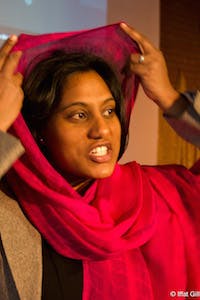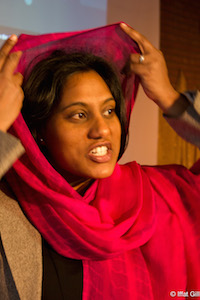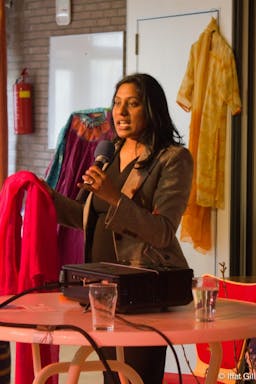From digital literacy advocate to digital isolation and back
Jan 21, 2015
Story


I cannot begin to count the positive effects on my life that being connected to the internet and consequently, the rest of the world, has had. Thanks to my father, I got a connection to the Internet when I was thirteen years old. At the time we were living in Malta. Five years later, my parents decided to move the family back to Pakistan. I was eighteen years old and got first hand experience of what it meant to be a young woman in Pakistani culture. I had been raised in a relatively traditional way but with modern values. Things were different in Pakistan.
I soon got over the initial culture shock. I learned how (semi-properly) wear a dupatta, the traditional scarf women wear. Slowly but surely, life became manageable again, although my “modern” values were in sharp contrast with what I saw around me. Girls should not laugh too loud. Running is not very lady-like. Education is useless, all you need to know is how to make a ‘handi-roti’ (proper meal) for your in-laws. It was suffocating.
After a few years, and with my fathers consent, I started a skill centre for girls who had had no education. Girls like twelve year old Asia, who was breaking bricks by the side of the road for a living. She used a hammer that was so big for her that it would have been comical if it weren’t so heartbreaking. Luckily for Asia, her parents were willing to give her an opportunity. They let her come to my centre and learn some skills.
As time went on, I became more and more connected and networked with the local human rights and women support groups. They helped me implement different empowerment projects for girls and women. Thanks to the Internet, my connections soon went beyond national borders. This was not just a positive. Empowering women in a sub-urban place means challenging the status quo. It means undermining the authority of traditional power structures and hierarchies. The resistance and hostility towards my work came not just from insecure men, but also from women, even in my own family. As my work expanded, travel increased, at times even internationally.
This was a big deal. Not just for me, as I got to travel on my own, to places I could only dream of before. But in small town Pakistan, a society where a woman’s place is within the four walls of her home, where a girl’s moral character is judged by how well she covers her self and her breasts with her dupatta, it was a huge deal. I became empowered to speak up for myself and other women. My Internet connection and digital literacy had empowered me to achieve a level of success no male member in my family or community had achieved. I was representing Pakistan and issues of Pakistani women at national and international platforms. I spoke of atrocities against women and religious minorities at national conferences. I advocated for meaningful participation of youth from developing countries to international platforms like the Internet Governance Forum. I was becoming too difficult to control. I had a career. That meant financial independence, which was considered even more dangerous. It meant that I might not agree to marry whoever my family would choose for me.
In 2009, my family got caught up in a financial dispute. In Pakistan, disputes are still often settled through traditional ‘jirgas' and ‘panchayats’. Village, tribal or community elders get together and judge whatever issue is brought to them. It is an alternative to the official court system, mostly for those without the financial means or the patience for the official judicial system. The dispute did not get settled in the panchayat and moved to the judicial system. My father was struggling to find a way out, through arbitration, and spent most of his time on this issue.
While my father was distracted, my mother felt she found an answer to all the family’s problems. Vani could solve the problem. Vani is originally a Pashtun custom, but it is often used to settle disputes between two clans or rival groups throughout Pakistan. Although the custom has been illegal in Pakistan since 2005, it is still quite common. Through Vani, my family would reconcile with the party we were having dispute with, who happened to be relatives as well. The practical part was this: as a peace offering, I was to be married to someone from the family on the other side of the dispute. Since, the dispute was with extended family from my mother's side, customs like Vani and forced marriage are also a way to protect the family property or land. The only problem was to get me to agree to it.
Something had to be done about my freedom of communication and movement. I woke up one day and found myself under house arrest and without my modem and laptop charger. It had not occurred to me before this incident how much the Internet had enabled me to empower myself socially and economically. Internet was seen as the first and immediate threat that needed to be taken care of.
Without connectivity, and stuck in my room, I found myself gasping for air. It was like I ceased to exist. I became a victim of the discriminatory practices against women I fought against! For months, no one in my professional circle knew what had happened to me. Some thought “she probably got married.” It is normal for women to stop having a career after they get married.
Luckily, I still had my mobile phone (without Internet though).
My mobile phone helped me lobby for my freedom. I am grateful and lucky to have quite a few forward thinking male members in my family. They stood up for me in family panchayats and eventually managed to get me out of the situation I was in. They agree with my work and are proud of it. One of my uncles, who has a daughter, said to me: “I want you to be my daughter’s mentor for the rest of her life!” Even in my family, with relatively liberal ideas and experience of living abroad, I would not been able to choose my own path if it hadn’t been for the help of male family members. As twisted as it sounds, that makes me one of the lucky ones.
I aim to bring the empowerment I obtained through digital literacy to other women in the local communities around the world. My digital literacy is what inspired me to start a technology center for girls like me, who were educated and wanted more from their life than just being groomed to please their future (or current) in-laws. Empowerment through digital literacy is the main aim of the initiative (ChunriChoupaal) I started. Girls and women have the right to be economically and socially independent just like any human. They have the right to be seen as independent human beings and not the property of the males in their families and communities. We need to empower local leaders to have the freedom to implement local solutions to address the problems the girls and women. Women should be empowered to raise their voice against the atrocities that are committed against them in the name of culture, tradition and religion!




